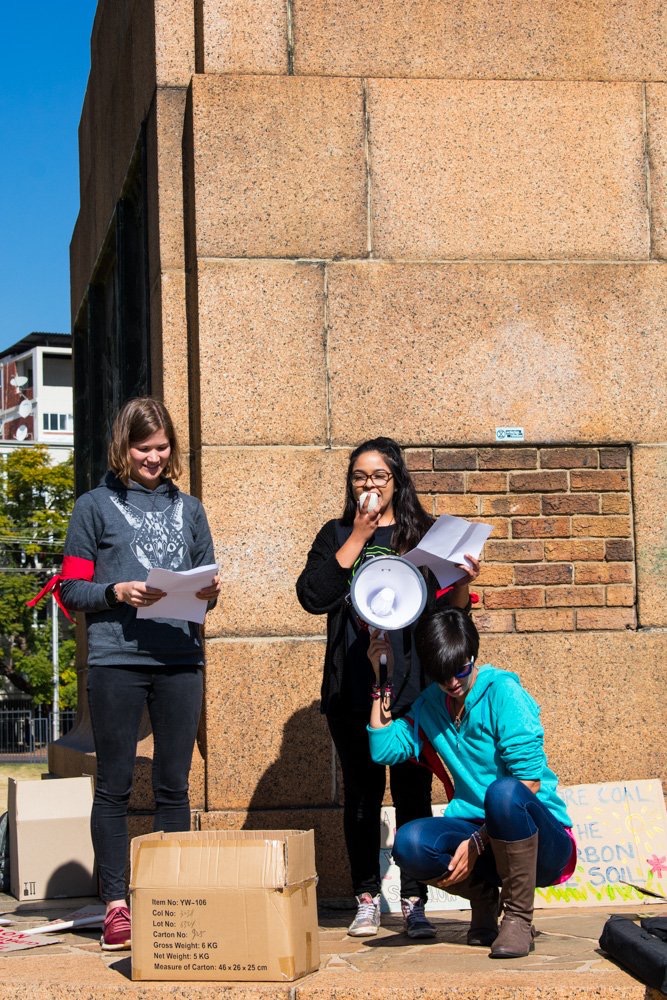HERstory: Courtney Morgan
- Humairaa Mayet

- May 25, 2021
- 4 min read
Updated: Aug 11, 2022
By Humairaa Mayet
Edited by Imaan Moosa & Tasmiyah Randeree
Courtney Morgan, a climate justice activist, talks to us about how the struggle for climate justice is, at its core, intersectional. The pursuit of climate justice is the pursuit of social justice.
Climate justice activist, Courtney Morgan. Photo: Provided.
I had this inner conflict, asking myself, ‘Do we save the planet first but leave society to break down and risk not having people to live on it, or do we save the people first and risk not having a planet for them to live on?’ Soon, I realised that climate change had the potential to unite various causes through the call for climate justice.
As of late, climate change has been emerging as an increasingly important issue, with the effects of climate change affecting other spheres of life. Climate change is one of the biggest challenges the world faces today and if left unresolved, will wreak irreparable damage.
Courtney Morgan, a 25-year-old climate activist, is seeking to raise awareness around climate change and has set out in the pursuit of climate justice.
The climate crisis is the single biggest threat to our existence as a species; it is not an exaggeration to say that this is an existential threat.
Morgan joined environmental clubs in high school and ran recycling campaigns at the tender age of 15, kickstarting her journey into climate activism. Once she became a university student, Morgan’s activism took a more decisive shape and ever since, she has been at the forefront of climate justice for over five years.
Courtney assisted in harvesting vegetables from a food garden. Photo: Provided.
Not only does Morgan play an active role in climate activism, she has also delved into research surrounding the problems of climate change.
She completed a Bachelor of Arts degree at the University of the Witwatersrand where she majored in geography, a Bachelor of Science honours degree in geography, and is currently working toward her masters in geography.
Climate justice is social justice.
At its core, the pursuit of climate justice is about far more than climate change — it draws upon issues of gender, race, class, and sexuality and seeks to integrate these into the broader discourse on climate change awareness.
Separating discussions about climate justice from social justice is just as harmful as excluding climate justice from wider discussions on social justice. In order to achieve both successfully, they must be pursued together.
Not only CAN social justice be pursued in tandem with the concerns around climate change, they HAVE to be pursued together.
Morgan told To EmpowHER, that climate change was predominantly spurred on by countries in the global north but has worse effects on the population in the global south.
This is inherently unjust as those who have caused the problem are not especially affected by climate change, yet those who have not been disproportionately affected.
Courtney Morgan raised awareness about the struggle for climate justice. Photo: Provided.
Over and above countries in the global south being harder hit than others, it is vulnerable groups that are most affected. Black and indigenous peoples, women, queer, and disabled individuals are exposed to the worst effects of climate change. According to Morgan, their struggle must be centred on the discourse on climate justice.
In South Africa, climate change is an important cause for concern, which has a multitude of ripple effects and spills over into an array of sectors. Morgan says that the realities of climate change must be positioned against the backdrop of the high unemployment rate and inequality that plague South African society.
It is imperative that, in the South African context, capitalism must be recognised at the root of climate change. Tackling the country’s high unemployment rate and inequality is tantamount to tackling capitalism, and this can ultimately be seen as tackling the climate crisis.
We need to present climate justice as a movement that has the potential to unite other movements under one banner.
Morgan was one of the researchers who contributed toward the Climate Justice Charter, which seeks to raise awareness about issues attributed to climate change by gaining endorsements and widely circulating the document.
Courtney picketing outside Parktown High School for Girls. Photo: Provided.
“The Climate Justice Charter is a living document that presents principles of engagement, goals, as well as systemic alternatives. The principles outlined in the charter encompass social justice: living simply and in harmony with nature; a deeply democratic form of engagement; socialised ownership of systems; decoloniality and breaking from imperial ideas of how to interact with nature; solidarity and intergenerational justice,” says Morgan.
The struggle for climate justice is ongoing and will only get stronger as climate change intensifies. In time to come, Morgan says the climate justice movement is expected to centre Black and indigenous women and take on more anti-capitalist dimensions.
Courtney speaking on the issue of climate change. Photo: Provided.
In the next few years, communities will exercise their agency and demand climate justice. This will result in the movement becoming increasingly political. This might be accompanied by the call for a system change as opposed to green capitalism, which has been the prevailing norm.
I see myself being a part of the movement in a way that supports and amplifies the voices of women on the ground and actively dismantles the systems that seek to exclude or side-line them.
More about Courtney Morgan:
Courtney enjoys outdoor time with family and friends and her hobbies include drawing, creating mendhi designs, anything involving art, and a good series binge, of course!
Courtney is an early riser and enjoys starting her days with a yoga session followed by a scroll through social media to catch up on what’s been happening.
Courtney assisted in penning the Climate Justice Charter. Now is your chance to sign the petition and endorse the charter! https://awethu.amandla.mobi/petitions/together-we-can-help-ensure-parliament-brings-an-end-to-water-problems-hunger-and-pollution
Follow and support Courtney on the following:
Twitter: @Courtz_RM
Instagram: @courtz_morgan














Comments